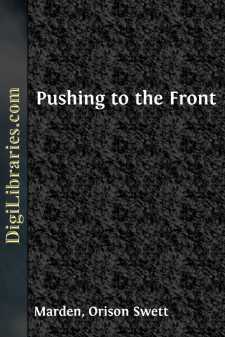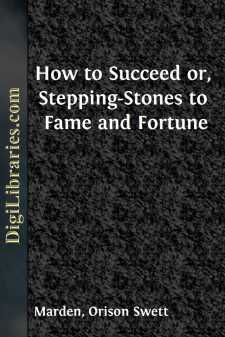Categories
- Antiques & Collectibles 13
- Architecture 36
- Art 48
- Bibles 22
- Biography & Autobiography 813
- Body, Mind & Spirit 142
- Business & Economics 28
- Children's Books 15
- Children's Fiction 12
- Computers 4
- Cooking 94
- Crafts & Hobbies 4
- Drama 346
- Education 46
- Family & Relationships 57
- Fiction 11828
- Games 19
- Gardening 17
- Health & Fitness 34
- History 1377
- House & Home 1
- Humor 147
- Juvenile Fiction 1873
- Juvenile Nonfiction 202
- Language Arts & Disciplines 88
- Law 16
- Literary Collections 686
- Literary Criticism 179
- Mathematics 13
- Medical 41
- Music 40
- Nature 179
- Non-Classifiable 1768
- Performing Arts 7
- Periodicals 1453
- Philosophy 64
- Photography 2
- Poetry 896
- Political Science 203
- Psychology 42
- Reference 154
- Religion 513
- Science 126
- Self-Help 84
- Social Science 81
- Sports & Recreation 34
- Study Aids 3
- Technology & Engineering 59
- Transportation 23
- Travel 463
- True Crime 29
Cheerfulness as a Life Power
Categories:
Description:
Excerpt
CHEERFULNESS AS A LIFE POWER.
I. WHAT VANDERBILT PAID FOR TWELVE LAUGHS.
William K. Vanderbilt, when he last visited Constantinople, one day invited Coquelin the elder, so celebrated for his powers as a mimic, who happened to be in the city at the time, to give a private recital on board his yacht, lying in the Bosphorus. Coquelin spoke three of his monologues. A few days afterwards Coquelin received the following memorandum from the millionaire:—
"You have brought tears to our eyes and laughter to our hearts. Since all philosophers are agreed that laughing is preferable to weeping, your account with me stands thus:—
"For tears, six times$600"For laughter, twelve times2,400————$3,000"Kindly acknowledge receipt of enclosed check."
"I find nonsense singularly refreshing," said Talleyrand. There is good philosophy in the saying, "Laugh and grow fat." If everybody knew the power of laughter as a health tonic and life prolonger the tinge of sadness which now clouds the American face would largely disappear, and many physicians would find their occupation gone.
The power of laughter was given us to serve a wise purpose in our economy. It is Nature's device for exercising the internal organs and giving us pleasure at the same time.
Laughter begins in the lungs and diaphragm, setting the liver, stomach, and other internal organs into a quick, jelly-like vibration, which gives a pleasant sensation and exercise, almost equal to that of horseback riding. During digestion, the movements of the stomach are similar to churning. Every time you take a full breath, or when you cachinnate well, the diaphragm descends and gives the stomach an extra squeeze and shakes it. Frequent laughing sets the stomach to dancing, hurrying up the digestive process. The heart beats faster, and sends the blood bounding through the body. "There is not," says Dr. Green, "one remotest corner or little inlet of the minute blood-vessels of the human body that does not feel some wavelet from the convulsions occasioned by a good hearty laugh." In medical terms, it stimulates the vasomotor centers, and the spasmodic contraction of the blood-vessels causes the blood to flow quickly. Laughter accelerates the respiration, and gives warmth and glow to the whole system. It brightens the eye, increases the perspiration, expands the chest, forces the poisoned air from the least-used lung cells, and tends to restore that exquisite poise or balance which we call health, which results from the harmonious action of all the functions of the body. This delicate poise, which may be destroyed by a sleepless night, a piece of bad news, by grief or anxiety, is often wholly restored by a good hearty laugh.
There is, therefore, sound sense in the caption,—"Cheerfulness as a Life Power,"—relating as it does to the physical life, as well as the mental and moral; and what we may call
THE LAUGH CURE
is based upon principles recognized as sound by the medical profession—so literally true is the Hebrew proverb that "a merry heart doeth good like a medicine."
"Mirth is God's medicine," said Dr....





